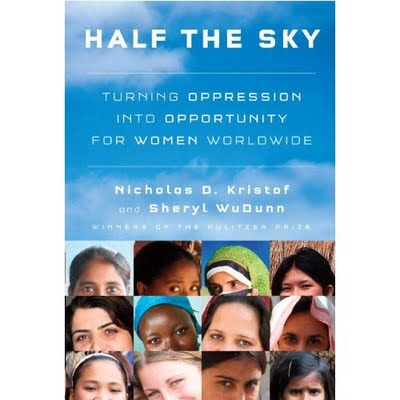 I just recently finished reading Nicholas Kristof and Sheryl Wu Dunn’s brilliantly written ‘Half the Sky’ and let me tell you right now that that was probably the single most agonizing book I have read to date. You don’t know how many times I had to put it down, weep a little, cuss a lot, and pick it up again just to repeat the process. Called ‘Half the Sky: Turning Oppression into Opportunity for Women Worldwide”, the book covers the often underreported issues of the sex slave trade, the crippling poverty that the world’s women share a disproportionate amount of (around 70% to be exact), maternal mortality (which takes a woman’s life every minute), and the misogynistic customs and traditions that so terribly degrade women to beneath human status.
I just recently finished reading Nicholas Kristof and Sheryl Wu Dunn’s brilliantly written ‘Half the Sky’ and let me tell you right now that that was probably the single most agonizing book I have read to date. You don’t know how many times I had to put it down, weep a little, cuss a lot, and pick it up again just to repeat the process. Called ‘Half the Sky: Turning Oppression into Opportunity for Women Worldwide”, the book covers the often underreported issues of the sex slave trade, the crippling poverty that the world’s women share a disproportionate amount of (around 70% to be exact), maternal mortality (which takes a woman’s life every minute), and the misogynistic customs and traditions that so terribly degrade women to beneath human status.
To say that the stories presented in the book are horrific would be the greatest understatement ever made, but at the same time, this should not be overshadowed by the fact that the stories also offer a profound, albeit distant, glimmer of hope. Yes, the stories are, at times, excruciatingly graphic, but to see how these women pull themselves out of what may just be the worst conditions known to the human race, is beyond inspiring. Kristof and WuDunn take us on such a raw and real journey connecting us with equally raw and real women from all continents of the world (you can read a few of their stories here). While reading the book, I was taken to the two extremes of the emotional and mental spectrum...from being repulsed by the despicable savagery our world's women must endure to being so moved and inspired by their sheer bravery, determination, and resilience.

Honestly, it’s a travesty that women around the world have to suffer these incredible injustices, but what’s even more tragic is that a lot of the people in our priveleged Western world don't really know about it. Okay sure, they (we) may have a vague idea, but it’s this abstract and distant fact that we come to simply accept and forget. I keep urging (pleading, begging) my family and friends to please read this book. But it’s hard because it deals with seriously tough issues and sometimes, it’s easier to just ignore it or sweep these realities under the rug because well, it doesn’t directly affect us...or at least not visibly so. And I totally understand that. The topics discussed in the book aren’t sexy and it’s not exactly the kind of book you want to curl up to at the end of a long day and fall asleep to. But it’s all too important not to read and I just can't stress that enough. If I could shout it out on the rooftops, believe me I would!! Melinda Gates put it best when she described the book as "...both a brutal awakening and an unmistakable call to action".
So please, if you consider yourself even remotely human (which I sincerely hope you do), please, please, read Half the Sky. And once you do, believe me, it will change you...






